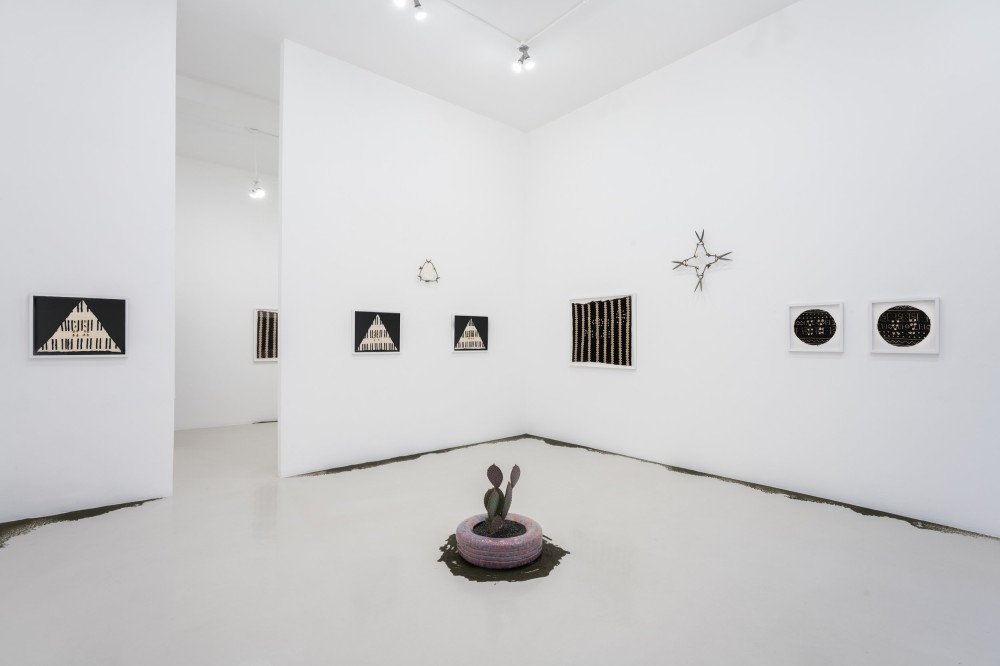
Patrisse Cullors and noé olivas: Freedom Portals
Patrisse and noé have been collaborators since they met in their graduate school art program at USC Roski in 2017. Both artists are practitioners of the Ifá religion, which is a member of the Yoruba family of religions from West Africa. In Yoruba tradition, Olódùmarè is the supreme being and creator of the universe, and an array of Orishas, or deities, mediate between Olódùmarè and the people of the earth. The Orisha of wisdom is known as Ọ̀rúnmìlà, whose teachings form the substance of Ifá. Ọ̀rúnmìlà communicated through a series of 16 Odù, or oral literary “books,” each of which has an alternative text, so a total of 256 poetic tutorials were handed down, meant to encapsulate all situations, circumstances, actions and consequences in life. These Odù are interpreted by Babalowo, or priests, to divine truths and to advise people seeking spiritual guidance.
Patrisse is creating the first 12 of the 16 Odùs, which are called the Mejis, using cowrie shells and yarn in concert with vintage mud cloth from Mali. This is the beginning of a larger project wherein Patrisse plans to create tapestries inspired by all 256 Odù. The cowrie shell is a richly symbolic object in Yoruba tradition, it has been used as money, as an instrument of divination, and as an element of royal decoration in crowns and garments. For the show noé is creating three portal pieces using garden clippers, glass, satellite fragments and copper. noé suggest metaphors of protection and labor. The portals themselves are suggestive of the act of is using tools as the building blocks for each portal to communicating to the Egbe, or spiritual community of beings no longer living but who are capable of being communicated with through Ifá divination. noé will also present several of his ceramic tire pieces which were featured in his Hammer Museum exhibition from 2021. The tire works are symbolic not just of work and labor, as they are casts of the tires from noé’s trusted Ford Ranger truck, but in this context the tires also function as vessels for offerings to the Orishas.
Freedom Portals and its emphasis on the Ifá religious tradition is equal parts devotional and metaphorical in nature and should be viewed in response to the contemporary moment and its accelerated pace and attendant exhaustion. This show and its artists evidence of a new form of social practice, community building, and self-care, achieved through the practice of ancient African spiritual tradition, and artmaking inspired by the same.
Patrisse, noé and alexandre ali reza dorriz founded the Crenshaw Dairy Mart Art Center at Manchester and Crenshaw in Inglewood, CA in 2020. The Dairy Mart is an artist collective and art gallery dedicated to shifting the trauma-induced conditions of poverty and injustice, bridging cultural work and advocacy, and investigating ancestries.
Patrisse Cullors (b. 1983, Los Angeles, CA) is a New York Times bestselling author, educator, artist, and abolitionist from Los Angeles, CA. Her work has been featured at The Broad, The Geffen Contemporary at MOCA, LTD Gallery, Crystal Bridges Museum, Second Home West Hollywood, The Fowler Museum, Frieze LA, The Hammer Museum, Vashon Center for the Arts, Joe’s Pub, Langston Hughes Performing Arts Center, and a host of theaters, galleries, and museums across the globe.
Cullors launched a ground-breaking Social and Environmental Arts Practice MFA program at Prescott College where she served as the Founding Director for two years. She is the co-founder of the Crenshaw Dairy Mart and has been on the frontlines of abolitionist movement building with Black Lives Matter, Justice LA, Dignity and Power Now and Reform LA jails. Her current work and practice is focusing on what she calls “Abolitionist Aesthetics,” a term she coined to help challenge artists and cultural workers to aestheticize abolition. Patrisse has won numerous awards for her art and activism. In September 2021, the Los Angeles County Board of Supervisors unanimously approved Patrisse’s appointment to serve as one of three Second District Arts Commissioners. Patrisse’s mission is to invite all of us to grow towards abolition through intergenerational healing work that centers love, collective care, and art.
noé olivas (b. 1987, San Diego, California—occupied Kumeyaay land) lives and works in South Central Los Angeles. He received his MFA from the University of Southern California in 2019, and his BFA from the University of San Diego, California in 2013. His work has been exhibited at the Candlewood Festival, Borrego Springs, California (2022); Hammer Museum, Los Angeles, California (2022); The Front Arte Y Cultura Gallery, San Ysidro, California (2021); Napa Hall Gallery at the California State University Channel Islands, Camarillo (2020); Open Mind Art Space, Los Angeles (2019); Residency Art Gallery, Inglewood (2019); Charlie James Gallery, Los Angeles (2019); La Jolla Historical Society, San Diego, California (2018 San Diego Art Institute, California (2017); The New Children’s Museum, San Diego, California (2017);); and the San Diego Museum of Art. (2017).
As part of the 2018 Mexicali Biennial, his work was also included in the traveling exhibition Calafia: Manifesting the Terrestrial Paradise at the Robert and Frances Fullerton Art Museum at the California State University, San Bernardino (2018), and Armory Center of the Arts, Pasadena, California (2019- 2020). olivas has also performed in Open Mind Art Space, Los Angeles (2019); The Geffen Contemporary at MOCA, Los Angeles (2020), Hauser & Wirth, Los Angeles (2018), and the NADA and Prizm Art Fair, Miami (2018) with collaborator Patrisse Cullors; and the Institute of Contemporary Art, Los Angeles (2018). With Patrisse Cullors and alexandre ali reza dorriz, olivas is co-founder of the Crenshaw Dairy Mart, an art hub in South Central Los Angeles and Inglewood.
Artist Instagram(s): @osopepatrisse @calmatetupedo @crenshawdairymart